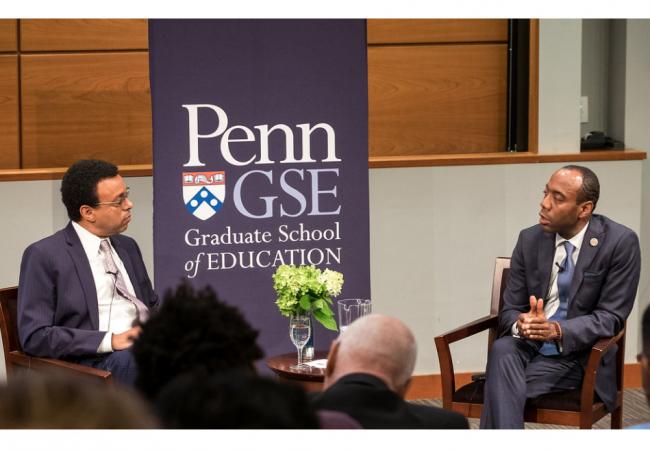Former NAACP president Cornell Brooks and Provost Wendell Pritchett discuss the future of charter schools

In 2016, after the NAACP passed a resolution calling for a moratorium on the expansion of charter schools, the organization began a nationwide listening tour to hear from people on all sides of the debate.
Cornell Brooks, who was then president of the NAACP, attended meetings across the country.
“What we heard over and over and over again, was that people were concerned not primarily about charter schools as such, traditional public schools as such, but they were concerned about the education of their children first and foremost,” Brooks told a full Fitts Auditorium crowd in late September.
He was at Penn to deliver the inaugural Steven S. Goldberg and Jolley Bruce Christman Lecture in Education Law, sponsored by Penn GSE and Penn Law. After his remarks, Brooks and Provost Wendell Pritchett — classmates at Yale Law — had a wide-ranging discussion about the American educational system.
Brooks, who led the NAACP until May, described how the moratorium resolution was meant to create a “reasoned pause,” so education leaders, community members, and parents could analyze what schooling approaches are working, and what harm others might be causing.
“The choices we face have often been false, and Faustian,” Brooks said. “The choices have often been that you can wait on a public school system that can never be saved or you can place your hopes, your dreams in terms of the next generation, in a charter school that is available to you through a lottery.”
During their conversation, Pritchett asked Brooks how he defined success in schools, acknowledging student test scores alone don't provide the answer.
“In many of our communities, success looks like preparing young people to be contributors to the community, as opposed to them being de facto wards of the state caught up in the criminal justice system,” Brooks said. “I never met anyone who didn’t take the first step toward the criminal justice system who didn’t have the school system fail them.“
When asked specifically about what school leaders should do if there were to be a moratorium on expansion, Brooks said he would encourage them to ask questions, and use the answers to create solutions.
“Will we see some charter schools not serving the full range of students, not being the same cost with respect to transportation and other services?” Brooks said. “If a locality says before we expand, we will address this, that’s reasonable.”
The issue engages people on an emotional level, Brooks said. Pritchett agreed.
“From my perspective, it’s good that people are upset and want to improve our education system,” said Pritchett, who previously served on Philadelphia’s School Reform Commission.
Closing out the evening, Penn GSE dean Pam Grossman thanked Brooks and Pritchett for offering a deep discussion of the school to prison pipeline, the role of the community in governing schools, and the purposes of education.
“It was a reasoned and rational discourse that is all too rare in this world,” Grossman said.
